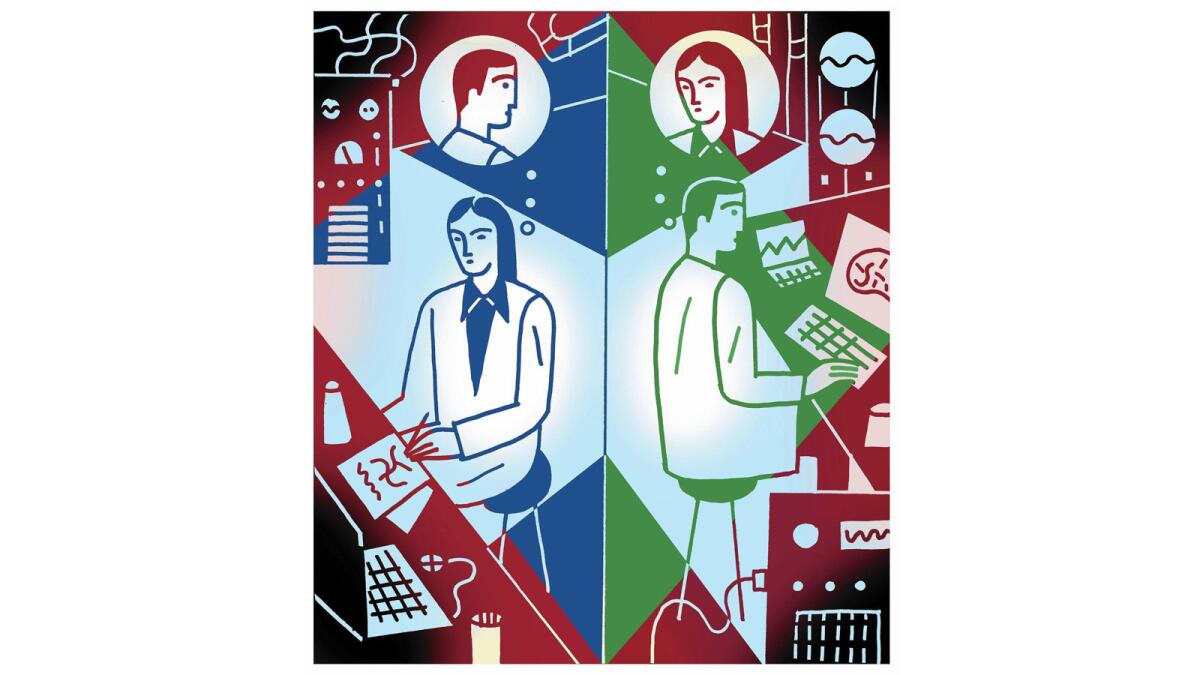How science taught me that love is all about failure

- Share via
I spent nearly six years in Los Angeles earning my PhD in neuroscience, a pursuit in which, as my father has observed, one of the most important lessons was how to fail. That is, how to try something really difficult, fail miserably and yet not let it ruin my confidence or determination.
It’s really tough; there are many low points involving disastrous experiments, failed hypotheses, manuscript rejections, impossible deadlines, self-doubt, financial instability, unsuccessful defenses and general frustration. It’s hard not to take it personally when your ideas get ripped apart and your approach criticized. My mentors and professors trained me to be persistent, to have patience, to change a single variable while holding the others constant and try again and again a hundred times until I make things work.
While this approach is great in science, I’ve come to learn that it can sometimes lead to disaster in love.
Through graduate school at USC I met my soul mate — let’s just say his Starbucks name is Fred.
My studies and adjustment to life in Los Angeles left me feeling overwhelmed, but Fred helped me cope. Beyond our mutual love of neuroscience, we shared a sense of adventure and an appreciation for arts and culture, as well as demanding lab schedules and barely livable graduate stipends.
We got creative, exploring the free events and cheap eats the city has to offer: walking tours of Little Tokyo, dinners at In-N-Out, astronomy lectures at UCLA, pupusas at Grand Central Market (before it was hip), studying at Viento y Agua in Long Beach, the grunion run in Santa Monica, hiking in Ranchos Palos Verdes, jazz at the Hollywood & Highland center and LACMA, gelato at Bulgarini’s in Altadena.
Gradually, I fell in love — both with L.A. and with Fred.
Years passed and we became bona fide scientists. I graduated first and found what seemed to be a too-good-to-be-true position to do postdoctoral training in Boston. We had weathered almost six years of hardship together in graduate school, so what was a little long distance?
Sometimes smart people are really stupid.
Maybe it was overconfidence that since I’d tackled scientific problems, mere human problems should be a piece of cake. Or maybe it was just the everyday problem of dual careers ripping relationships apart. The obdurate tenacity that we learned in graduate school led to a nearly four-year downward spiral of trying to hold something together that maybe should have been allowed to fall apart.
Things got really hard, what with three time zones and 3,000 miles separating us. We lost the companionship that we both relied on to deal with the stress of either finishing the PhD or adjusting to a new job in a new city. To make matters worse, my postdoc in Boston turned out indeed to be toogood to be true, and I began to wholly question my approach to the problems of career and love. It felt like a failure of the most personal kind, that I myself was a failure.
Are you a veteran of the L.A. dating scene? Share your story
I reasoned that since my career options were wide open, I should try eliminating the long-distance variable from the relationship. Luckily, I found another postdoc position in San Diego, making it a “short-distance” relationship, as Fred was fond of saying. However, seeing each other every weekend didn’t bridge the distance that had grown between us. To change more variables, he got a job in San Diego after graduating and we moved in together, but still things were hard between us. We took up sailing, explored our new city, took vacations together. Still hard.
One variable I didn’t account for was L.A. itself; San Diego is nice, but we were both homesick for L.A. I didn’t realize how strong that feeling was for Fred until one day he told me he’d been invited to interview for his own too-good-to-be-true position in Beverly Hills. A few days later, he got it. My world came crashing down, but, as I’d learned to do in graduate school, I coped by tamping down my distress and formulating a plan to keep going. I was not a quitter; this was not an insurmountable problem, just a difficult one.
We lasted 11 more months, again spending endless hours driving back and forth between San Diego and L.A. every weekend. I was so determined to make it work that I did most of the driving, despite experiments waiting for me in the lab. We missed each other’s work parties, hangouts with friends and game nights. Eventually things reached a breaking point and, to my chagrin, I was caught completely by surprise. It was devastating; not only had we failed, but I was utterly heartbroken over losing my best friend. Our efforts to save the relationship had seemingly only prolonged the agony and have since made it hard for me to even visit L.A.
Being a scientist, I have spent a lot of time reflecting on the lessons I’ve learned from this, to try to draw conclusions from my experience so I can apply them to future experiments in love.
So far I’ve learned three things: (1) sometimes a problem persists for so long, and we are so deep in it, that we fail to see that it has changed in some fundamental way; (2) it’s a losing battle to compete for someone’s affections with the city of Los Angeles; and (3) sometimes, despite your best efforts, the only way to solve a problem is to fail.
Knowlton is a research scientist in San Diego.
L.A. Affairs chronicles the current dating scene in and around Los Angeles. We pay $300 a column. If you have comments or a true story to tell, email us at LAAffairs@latimes.com.






